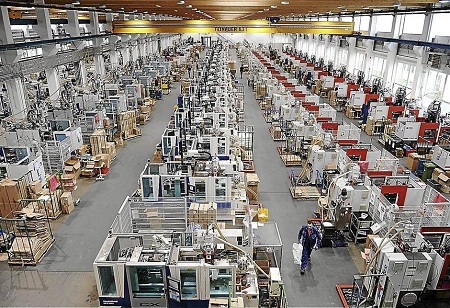
The manufacturing sector makes up 23% of Malaysia's Gross Domestic Product (GDP), just behind the service sector. The government has invested heavily in the manufacturing industry, providing tax incentives and other benefits to attract foreign investment. Manufacturing in Malaysia is also buoyed by the country's relatively low labor costs and geographical proximity to major regional markets. This makes it attractive to foreign investors. Additionally, the country has a well-developed infrastructure and a strong legal system, establishing it as an ideal location for manufacturing. These factors have contributed to a surge in manufacturing in Malaysia over the past few years. It has a favourable location between major Asian markets, making exporting easy. The country also has a skilled and educated labour force and the cost of doing business is relatively low. Finally, the government has implemented policies to attract more foreign investment in the manufacturing sector. These factors have led to a significant increase in exports in recent years, which has contributed to economic growth. The government is now focused on diversifying the economy and encouraging foreign investment.
Let us find out why manufacturing in Malaysia is on a rise in the subsequent paragaphs -
Infrastructural location.
Imports and exports from Malaysia are competitively advantaged by its location. Malaysia is strategically situated between the Indian and Pacific Oceans, making it an ideal hub for global trade. Additionally, it has well-developed ports and airports, which facilitate the movement of goods in and out of the country. Its proximity to other Southeast Asian countries also provides a competitive edge. Malaysia also has a strong infrastructure, with a well-developed road, rail, and telecommunications network. These provide efficient transportation of goods and services throughout the country. Additionally, its transparent and business-friendly government policies further support its competitive edge in global trade. The country also offers many incentives to attract foreign investment, such as tax exemptions and attractive loan packages. Malaysia has a diverse economy, and the government has made great efforts to create an attractive environment for businesses. For example, the government has implemented several initiatives such as the Multimedia Super Corridor and the Iskandar Malaysia project, both of which aim to stimulate economic growth and attract foreign investments.
Governed Economic Stimulus.
The government has introduced several initiatives to help the manufacturing industry grow exponentially in Malaysia. This, in turn, creates jobs, strengthens the economy, and improve the quality of life. The government also invests in infrastructure and technology to ensure global competitiveness. This has enabled the country to become a major hub for global trade and investment. This has enabled Malaysia to stay ahead of regional competitors and become an attractive destination for global investors. As a result, the manufacturing sector has grown significantly, contributing significantly to the country's GDP. This has enabled the country to create jobs and reduce unemployment, leading to improved living standards. The economic growth has also increased government revenue, enabling the government to invest in social welfare programs. This, in turn, has had far-reaching positive impacts on Malaysians, from greater job security to increased access to education, healthcare, and other essential services.For instance, the government has increased the minimum wage and implemented free healthcare and education programs to improve the quality of life for citizens.
Free Trade Zones.
Malaysia's robust infrastructure and strategic location have made it an ideal place for setting up factories and manufacturing facilities. This makes it a hub for global trade and commerce, creating significant economic opportunities for the country. Malaysia has also seen a surge in foreign direct investment, with many multinational corporations setting up operations in the country. This has created jobs and boosted the national economy. Malaysia offers a range of incentives for businesses to invest in the country, such as tax breaks and subsidies. These have helped attract even more foreign investment, further boosting the nation's economy. For example, the Malaysian Investment Development Authority has allowed companies investing in the country to claim income tax breaks for between five and 10 years. In certain cases, the government is even willing to extend these tax breaks beyond 10 years.
In conclusion, Malaysia has to offer a wealth of skilled workers, language capabilities (most Malaysians are bilingual or trilingual), a developing infrastructure, close proximity to China and ASEAN suppliers, and an easy business environment based on cost. These advantages create a great environment for businesses to operate and grow. This is why many international companies have chosen Malaysia as their base of operations in the region. Malaysia is a great choice for businesses looking to expand their presence in the ASEAN region. It offers many benefits such as low taxes, easy access to markets, and a business-friendly environment. It is also well-connected to the rest of the world, making it an ideal location for businesses looking to expand.

